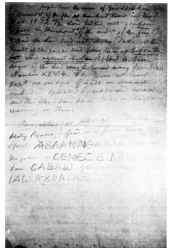
Vol 13 Page 348
[ON SEPARATION OF NATIONS, GESTURE LANGUAGE, SANSKRIT.]
[Fragment in H.P.B.’s handwriting in the Adyar Archives.—Compiler.]
The Medes, Kelts, Slavs, Hindus, Persians, Greeks, Romans, Germans make their appearance in your history as nations and peoples separate in language and history, each with its own far remote past, its distinct traditions and customs between 2 and 4,000 years ago. They are called Aryan and Caucasian races, all said to come from one and the same stock, the early Vedic Aryans of the Oxus and what not. And yet that separation of nations, since no more than between 3 and 4,000 years is allowed for the Vedas, though the Brahmans are known to have brought them with them to India [sic.]. Thus your history thanks to philology, ethnology makes of this separation of nations a real Tower of Babel . . . plus language — as separate history, types, colours and customs for each. We say—and we have positive historical proof to that effect—that the so-called barbaric peoples “the physical and political representatives of the nascent Aryan race speaking a now extinct Aryan language” that stood before this division of nations, had a higher civilization as a root race and its sub-races than has yet been found in the geological strata. And thus though it is granted that the farthest date to which documentary record extends is but the first, the earliest glimmer, the nearest visible point of your historic period beyond which stretches back an immense and indefinite series of prehistoric ages, yet no civilization, nothing but barbaric savage men preceded for a 100,000 years the 3 or 4,000 years of comparative [word illegible] and the 2 or 3 hundred years
Page 349
of actual civilization. Nay the very period when nascent human speech was preceded by gesture signs, is found preceding the Sanskrit, the most perfect as the most grand of all human languages, but by a couple of thousand years or so!
The process of induction is challenged by historical writers, lions followed by a herd of jackels of the daily press. [Here follows a crossed out sentence.]
Thus geologists carry man’s first appearance into the period of post-glacial drift, in what is now called the Quaternary period. And while the former period was undeniably between 250 and 300,000 years back yet the Encyclopaedists persist in saying that it indicates an antiquity only of—“at least of tens of thousands of years.” The idea is supremely absurd both from physical and ethnological as from psychological evolutionary standpoint. Taking their own figures to imagine that the host of races during the last 25,000 years should have been no better than animals, savage and uncivilized barbarians at best, and then from men of the Palaeolithic, old stone age, followed by those of the Neolithic or new stone age down to the races of the bronze and early iron ages with which commences historical antiquity in Europe, to make a clear jump to the old Babylonian and Egyptian civilizations, is rather a risked undertaking. Why not rather infer that since between the high civilizations of Greece and Rome and the Modern one—hardly 200 years old—there was the black gap of the dark and Middle Ages, the miniature scale of one of the smaller cycles, so there may have been a similar gap between the older Babylonians and Chaldeans and such high civilization as traced by every [word illegible] unbiased Orientalist in Egypt and Babylonia 10 and 15,000 years, and the preceding high civilizations of sub-races now extinct. The 20 centuries of European history are unable either to fix an age for the stone implements found in the Thames or the French Somme. Not only that the drift of glaciers and ground-ice, but also other geological changes [have] to be taken into consideration before assigning an age even to the relics of the bronze, and the artistic and polished [word illegible] of the Neolithic
Page 350
age, let alone the drift implements of the older stone age. The modern reckoning of ages was never more vastly out of proportion to historical chronology than in the present case. Sixty feet deep in the borings made in the alluvium of the Nile Valley where burnt bricks and pottery were found represent at least 25,000 years, and when they dig in certain localities, 120 feet deep. If only traces of various intermediate civilizations of a lower order were hitherto found, it does not stand to reason that there were none of a higher order but only that ancient civilizations being of another order and the antiquity of monuments found being generally discarded and the relics of a more intellectual [word “being” crossed out by H.P.B.] having failed to reach us—as the relics of your modern literature, arts and sciences will fail to reach the 6th race archaeologists:—it is but natural to find, etc. Relics of social and psychological culture can hardly be found in geological strata, in layers of soil. In Italy, Germany and elsewhere remains of a long pre-Roman civilization have been found. The connection between inland seas and the Ocean has greatly changed, in many cases was entirely broken since the time of the Bronze Age. But so long as the ruined cities of Egypt, like that of Ramses will have to wait for and depend upon their identification and chronology in the Mosaic books, no age can be assigned to them. The Brugsch-Beys are numerous and their authority too little questioned and too much depended upon. All that which goes beyond the few pages of universal History now entirely in the hands of Western Christian nations becomes the mythical portion, all that is found recorded in the unauthenticated chronicles of a small tribe the origin of which your historians cannot prove, is—authenticated history.

A facsimile of the article that follows


